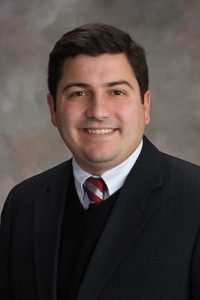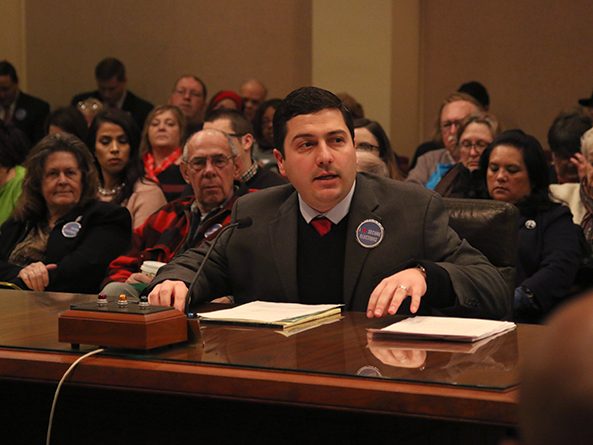Voter ID requirement proposed
Nebraska voters would be required to show photo ID at the polls under a bill considered Feb. 8 by the Government, Military and Veterans Affairs Committee.

LB1066, introduced by Gretna Sen. John Murante, would require voters to provide a qualifying form of photographic identification before voting. These would include a:
• driver license or state or territorial ID issued by a U.S. state or territory;
• photo ID issued by an accredited postsecondary educational institution;
• U.S. passport or U.S. military ID card; or
• ID issued by a political subdivision of the state of Nebraska.
An individual who does not show photo ID at his or her polling place could cast a provisional ballot and would have seven days to present acceptable photo ID at the local election office.
In addition, the bill would require the Nebraska secretary of state to provide photo ID for voting purposes at no charge to a registered voter who successfully applies for one. The application process would be determined by the secretary of state’s office.
LB1066 specifies that the cost of providing such photo ID would be paid from the state’s general fund appropriation to the secretary of state’s office. The bill’s fiscal note estimates the cost of providing equipment to local election officials to issue IDs, as well as training and public education, to be $2.9 million in fiscal year 2018-19.
Murante said he believes that the bill could be implemented for a substantially lower cost, stating that much larger states have implemented similar voter ID requirements at a “fraction” of the estimate for Nebraska.
In addition, he said, approximately 97 percent of Nebraskans already possess one of the required forms of photo ID. The law would not infringe upon anyone’s right to vote, he said, but would protect the integrity of the state’s voting system.
“I believe that securing our elections is a fundamental responsibility—certainly of this committee, which has jurisdiction over elections—but also the entire Legislature,” Murante said. “This is a basic, common-sense approach that the majority of Nebraskans support.”
Missouri Secretary of State John Ashcroft testified in support of the bill, saying a similar law was successfully implemented in his state in June 2017. Missouri has spent $1.5 million on the process, he said, which is significantly less than the $4 million to $5 million that was estimated.
Since implementation, he said, Missouri has conducted over 80 elections.
“We have not had a single individual who was legally registered to vote who was turned away from voting,” Ashcroft said.
Also supporting the bill was Susan Gumm of Omaha. Voter ID requirements give the public some assurance that their vote counts, she said, and an electoral system without proper safeguards cannot inspire public confidence.
“Honest elections are the foundation of representative government,” Gumm said. “If you aren’t actively looking for voter fraud, you won’t find it. In close or disputed elections, a small amount of fraud can make a difference and there are many elections, particularly at the local and state level, that are decided by a very small number of votes.”
Kristin Pfabe of Lincoln testified in opposition to the bill, saying the Nebraska secretary of state has affirmed that Nebraska does not have a problem with in-person voter fraud. Such voter fraud is rare, she said, because an individual would have to know another voter’s name, address and polling place—and hope that they had not already voted—in order to be successful.
“It’s a terribly inefficient and risky way to try and steal an election,” Pfabe said. “If you are motivated enough to sway an election, wouldn’t you choose a safer method with a bigger pay-off, like canvassing, making phone calls and talking to friends and family about candidates?”
Suzan DeCamp of AARP Nebraska also opposed the bill. Many older Nebraskans do not have a driver license or other form of photo ID, she said, and the additional requirement that the bill would impose would fall most heavily on the state’s aging population.
“Voting systems should be designed to encourage maximum participation in the electoral process,” she said. “States should not impose identification requirements that discourage or prevent citizens from voting.”
Nate Dobbs of Nebraska Appleseed expressed concern that the bill does not specify the process by which an individual would apply for a free photo ID if he or she lacked one. Testifying against the bill, he said many eligible voters currently do not possess a photo ID and the process of obtaining one through the secretary of state’s office could involve conditions, documentation requirements or deadlines that would be cumbersome.
“There is really no way right now to have a meaningful, robust discussion about the real impact of that scenario,” he said.
The committee took no immediate action on LB1066.


